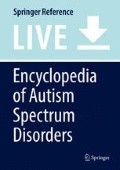References and Reading
American Psychiatric Association. (2013). Diagnostic and statistical manual of mental disorders: DSM-5. Washington, DC: American Psychiatric Association.
Baker, A. C., Jensen, P. J., & Kolb, D. A. (2002). Conversational learning: An experiential approach to knowledge creation. Portsmouth: Greenwood Publishing Group.
Chevallier, C., Kohls, G., Troiani, V., Brodkin, E. S., & Schultz, R. T. (2012). The social motivation theory of autism. Trends in Cognitive Sciences, 16(4), 231–239.
Constantino, J., & Gruber, C. (2005). Social responsiveness scale. Los Angeles: Western Psychological Services.
Dawson, G., Webb, S. J., & McPartland, J. (2005). Understanding the nature of face processing impairment in autism: Insights from behavioral and electrophysiological studies. Developmental Neuropsychology, 27(3), 403–424.
Gresham, F. M., & Elliott, S. N. (2008). Social Skills Improvement System (SSIS) rating scales. Minneapolis: Pearson.
Ko, J. A., Miller, A. R., & Vernon, T. W. (2018). Social conversation skill improvements associated with the START program for adolescents with ASD: Results of a randomized controlled trial. Autism. Online First Publication.
Kolb, D. A. (2014). Experiential learning: Experience as the source of learning and development (2nd ed.). Upper Saddle River: Pearson Education.
Kolb, D. A., Boyatzis, R. E., & Mainemelis, C. (2001). Experiential learning theory: Previous research and new directions. In R. J. Sternberg & L. F. Zhang (Eds.), Perspectives on thinking, learning, and cognitive styles (pp. 227–247). Mahwah: Lawrence Erlbaum.
Locke, J., Ishijima, E. H., Kasari, C., & London, N. (2010). Loneliness, friendship quality and the social networks of adolescents with high-functioning autism in an inclusive school setting. Journal of Research in Special Educational Needs, 10(2), 74–81.
Mazurek, M. O. (2013). Loneliness, friendship, and Well-being in adults with autism spectrum disorders. Autism. https://doi.org/10.1177/1362361312474121.
Miller, A. R., Vernon, T. W., Wu, V., & Russo, K. (2014). Social skill group interventions for adolescents with autism spectrum disorders: A systematic review. Review Journal of Autism and Developmental Disorders, 1(4), 254–265.
Orsmond, G. I., Krauss, M. W., & Seltzer, M. M. (2004). Peer relationships and social and recreational activities among adolescents and adults with autism. Journal of Autism and Developmental Disorders, 34(3), 245–256.
Schmidt, C., Stichter, J. P., Lierheimer, K., McGhee, S., & O’Connor, K. V. (2011). An initial investigation of the generalization of a school-based social competence intervention for youth with high-functioning autism. Autism Research and Treatment, 2011, 1–11.
Schroeder, J. H., Cappadocia, M. C., Bebko, J. M., Pepler, D. J., & Weiss, J. A. (2014). Shedding light on a pervasive problem: A review of research on bullying experiences among children with autism spectrum disorders. Journal of Autism and Developmental Disorders, 44(7), 1520–1534.
Vernon, T. W., Miller, A. R., Ko, J. A., Barrett, A., & McGarry, E. (2018). A randomized controlled trial of the Social Tools and Rules for Teens (START) program: An immersive socialization intervention for adolescents with ASD. Journal of Autism and Developmental Disorders, 48(3), 892–904.
Vernon, T. W., Miller, A. R., Ko, J. A., & Wu, V. (2016). Social Tools and Rules for Teens (The START program): Program description and preliminary outcomes of a multi-component socialization intervention for adolescents with autism spectrum disorder. Journal of Autism and Developmental Disorders, 46(5), 1806–1823.
Watkins, L., O’Reilly, M., Kuhn, M., Gevarter, C., Lancioni, G. E., Sigafoos, J., & Lang, R. (2015). A review of peer-mediated social interaction interventions for students with autism in inclusive settings. Journal of Autism and Developmental Disorders, 45(4), 1070–1083.
Author information
Authors and Affiliations
Corresponding author
Editor information
Editors and Affiliations
Rights and permissions
Copyright information
© 2019 Springer Science+Business Media, LLC, part of Springer Nature
About this entry
Cite this entry
Vernon, T.W., Miller, A.R., Ko, J.A., Barrett, A.C., McGarry, E. (2019). Social Tools And Rules for Teens (START) Program. In: Volkmar, F. (eds) Encyclopedia of Autism Spectrum Disorders. Springer, New York, NY. https://doi.org/10.1007/978-1-4614-6435-8_102201-1
Download citation
DOI: https://doi.org/10.1007/978-1-4614-6435-8_102201-1
Received:
Accepted:
Published:
Publisher Name: Springer, New York, NY
Print ISBN: 978-1-4614-6435-8
Online ISBN: 978-1-4614-6435-8
eBook Packages: Springer Reference Behavioral Science and PsychologyReference Module Humanities and Social SciencesReference Module Business, Economics and Social Sciences

